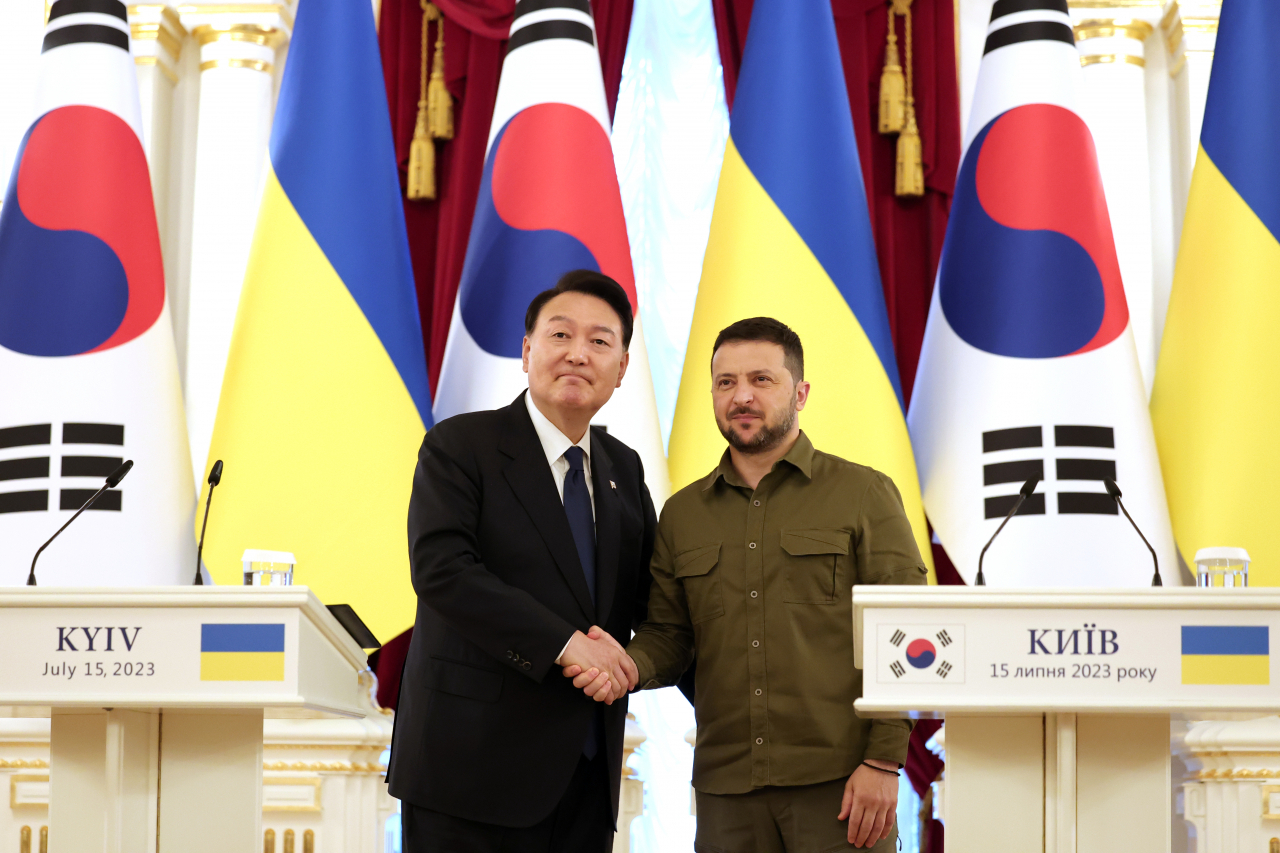Yoon seeks tighter coalition on Ukraine, drawing support as well as concerns
By Choi Si-youngPublished : July 18, 2023 - 17:38

President Yoon Suk Yeol was seen bolstering a push to insert South Korea into a tighter coalition of Western countries decrying Moscow for its war in Ukraine during a surprise trip to Ukraine’s capital Kyiv last week, following his participation in the NATO summit and visit to Poland.
The tour Saturday that covered the towns of Bucha and Irpin outside Kyiv, the alleged sites of Russian massacres, included a meeting with Ukrainian President Volodymyr Zelenskyy -- the culmination of Yoon’s efforts to deliver on solidifying a coalition of democracies.
The South Korean leader, who has made defending freedom integral to his foreign initiatives, pledged solidarity with Ukraine against Russia’s invasion, which Yoon called “illegal” in talks with the Ukrainian leader. Ahead of the meeting, Yoon laid flowers at a wall of remembrance.
“If we keep fighting with a united front, we will surely preserve our freedom and democracy,” Yoon said during a press conference after the meeting, promising nonlethal military and humanitarian aid, which Yoon said will total $150 million this year from $100 million last year.
At a weekly Cabinet meeting Tuesday, a day after his return, Yoon reaffirmed his commitment to aiding democracies in need, dedicating almost half of his opening remarks laying out what the latest meeting with the Ukrainian leader at war means for South Korea.
“The rules-based international order will take a hit if an armed aggression meant to take away sovereignty at the expense of civilians and children is tolerated,” Yoon said, noting he will stand united with the Ukrainians until they restore freedom.
Addressing potential criticism that the Western military alliance summit has little to offer to South Korea, Yoon said, “Deeper security cooperation with NATO countries means bigger economic ties with them,” adding Asia’s fourth-largest economy could see a boost to its exports and foothold in global markets.
Cha Du-hyeogn, chief of the Center for Foreign Policy and National Security at the Asan Institute for Policy Studies in Seoul, said the Yoon-Zelenskyy meeting was “symbolic,” calling it a signal to the outside world that South Korea “more than just supports Ukraine in its war against Russia.”
“This also has reinforced a coalition of democracies, the US-led alliance that’s rallying like-minded countries across the globe,” Cha said, referring to South Korea’s biggest ally.
More, Yoon’s tour adds credibility to the administration’s push to raise the country’s global profile to what it terms as a “global pivotal state” -- a country just as invested in taking on bigger global roles during crisis as it is in advancing its political and economic interests, according to Park Won-gon, a professor at Ewha Womans University.
Freedom, peace and prosperity are central to the Yoon administration’s “Indo-Pacific Strategy,” its signature foreign policy some say will define his presidency as Seoul potentially looks to elevate its standing while working with countries sharing similar values.
“The heads of state for the Group of Seven countries already paid a visit there, so in a way Yoon had to go in as well to prove to them that South Korea was really up for the bigger global roles it says it’s ready to assume,” Park said.
But South Korea could be unnecessarily overstepping in America’s anti-China plan to rally allies in NATO and Asia, said Kim Joon-hyung, a professor of international studies at Handong Global University.
“How far we can go is something we should keep in mind,” Kim said. Kim, former chancellor of the Korea National Diplomatic Academy, a Foreign Ministry body that trains diplomats, was wary of the administration’s next step for Ukrainian support, saying, “Upgrading our support to providing lethal weapons or troops even could be crossing a red line.”
The Defense Ministry in Seoul maintains that its policy not to offer lethal arms remains unchanged, and that it is looking into whether to send over military supplies Ukraine requested, such as demining equipment and ambulances. Mine detectors and hazmat suits are already on the way, it says.
In a local radio interview Monday, First Vice Foreign Minister Chang Ho-jin said there was “no completely new aid South Korea is introducing right now,” saying the ministry has a way of managing Seoul-Moscow ties so they are not easily rocked by spillovers.
“Given that, Yoon’s trip wouldn’t push ties to a test,” Chang said. The former ambassador to Russia, who stressed Korea was not offering lethal support, noted that the two countries have an unspoken rule of tolerating each other’s actions, without elaborating.











![[Kim So-hyun] The quiet taxi driver from Paris](http://res.heraldm.com/phpwas/restmb_idxmake.php?idx=644&simg=/content/image/2024/04/25/20240425050891_0.jpg&u=)







